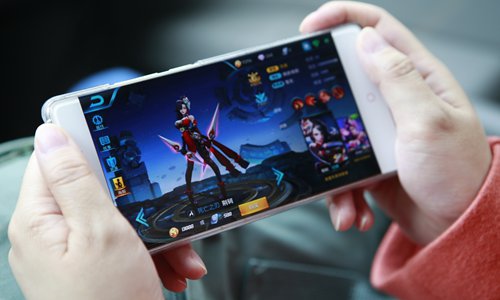
The controversial hero Jing Ke in King of Glory (Photo: Li Hao/GT)
Li Ming (pseudonym), a 13-year-old student in his first year of the middle school, has spent most of his spare time on a mobile game, King of Glory, since May, when he was still in primary school. The game is developed by Chinese Internet giant Tencent and is kind of a mobile version of the League of Legend (LoL).
"Every boy in our class is playing it, and we hold competitions within and among classes," Li said. "Good players are respected and it is easier for them to make more friends."
In the game, players choose a hero to practice 5 vs 5 battles, with each hero having different characteristics and magical attack modes. The heroes in King of Glory, unlike the fictional ones in LoL, are mostly based on figures from ancient Chinese history, like China's first emperor Ying Zheng, China's first and only female emperor Wu Zetian, the famous poet Li Bai in Tang Dynasty (618-907), and Jing Ke, an assassin renowned for his failed assassination attempt of Ying Zheng.
Li said one of the most important reasons he loves the game is because the historical characters are all caricatured in cartoon style and look "very cool." His favorite hero is Jing Ke, one of the most popular heroes in the game. "She's pretty and sharp as a razor," he said.
The real Jing Ke was a man. However in the game he has been turned into a sexy girl with barely any clothes on. And this has aroused controversy on the Internet. Some parents are worried that it may mislead their children and have a bad influence on their study, especially of history and Chinese.
Zhang Liang, a 27-year-old IT worker and part-time game anchor, told Metropolitan that he thinks such worries are reasonable, but the problem is not alarming.
"At the beginning I was surprised and was not very comfortable when I found that Jing Ke was presented as a sexy girl; at least I think the game developers should respect our history," he said. "But there are too many details not in line with history. For example, the famous doctor Bian Que in the Warring States Period (475BC-221BC) has been presented as a master in poison use. So game is just a game."
Zhang said that games are now an irresistible part of every child's life, and game developers need to respect the history more and study from Western and Japanese game producers.
Zhang's favorite video game is the Assassins Creed series, an action game produced by Ubisoft. In different versions of the game, the player acts as an assassin with secret tasks. The historical backgrounds of the versions are different, but quite real and in line with the history.
"The game's settings include ancient Rome, India, and China, and I like the China version most," Zhang said. "It took place in the Ming Dynasty in the April of 1521, when emperor Zheng De died, leading to a chaos in the palace. Players can also meet and interact with Wang Yangming, a famous philosopher, whose opinions are represented correctly in the game."
Zhang also used another popular mobile game Touken Ranbu Online as an example. "The game is famous for its personification of renowned Japanese swords in history - every sword was turned into a handsome guy," he said. "Since swords are an important part of Japanese history, the storyline of the game contains large quantities of real historical incidents and details, which is reported to have become historical material for Japanese children."
Zhang pointed out that a proper use of history or legendary materials in games should combine education with entertainment, but it would require profound historical knowledge, and Chinese game developers still have great space and potential to grow. "Like King of Glory, there's neither a storyline nor a historical background, so it is weird that the famous assassin was turned into a woman."
After all, Zhang said the root cause of the problem is that there is no game rating system in China to protect children who are too young to distinguish virtual world from real history.
"If primary school students are prevented from playing the game, the problem will be resolved," he joked.


















































